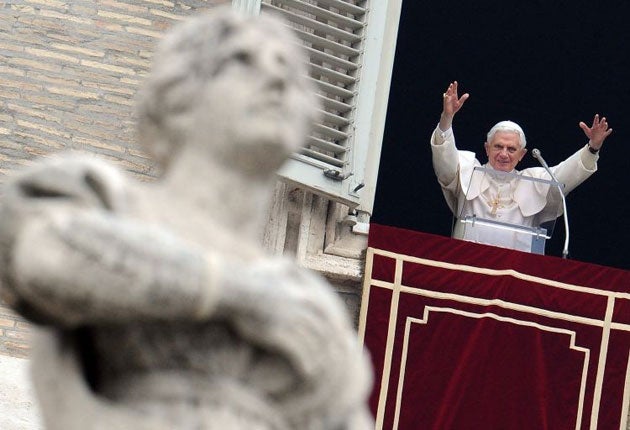Is the Catholic Church in favour of GM crops?
Lab Notes

Your support helps us to tell the story
From reproductive rights to climate change to Big Tech, The Independent is on the ground when the story is developing. Whether it's investigating the financials of Elon Musk's pro-Trump PAC or producing our latest documentary, 'The A Word', which shines a light on the American women fighting for reproductive rights, we know how important it is to parse out the facts from the messaging.
At such a critical moment in US history, we need reporters on the ground. Your donation allows us to keep sending journalists to speak to both sides of the story.
The Independent is trusted by Americans across the entire political spectrum. And unlike many other quality news outlets, we choose not to lock Americans out of our reporting and analysis with paywalls. We believe quality journalism should be available to everyone, paid for by those who can afford it.
Your support makes all the difference.Is the Vatican close to endorsing the cultivation of genetically modified (GM) crops in order to feed the world's growing population? Could it be that the Catholic Church is about to take a moral position on GM food?
A leaked document from a group of scientists linked to Rome has set a hare running about the possible endorsement of GM technology by the Pope. The document, from scientists linked to the Pontifical Academy of Sciences, suggested that there is a moral duty to adopt GM technology in order to combat hunger.
The document was drawn up following a "study week" sponsored by the academy last year, but it has only recently come into the wider public domain. About 40 scientists, including a handful of academy members, met behind closed doors in May 2009 to discuss "transgenic plants for food security in the context of development".
Their report came to several conclusions, including the need to develop new agricultural techniques to feed the present world population of 6.8 billion people, some one billion of whom are undernourished. Perhaps the most striking conclusion was that GM technology is contributing towards addressing the challenges of unsustainable agriculture and that there is "nothing intrinsic" about GM crops that would make food unsafe.
"Special efforts should be made to provide poor farmers in the developing world with access to improved [GM] crop varieties adapted to their local conditions," the report also says.
Perhaps understandably, the interpretation that this has opened the way for the Vatican to endorse GM food has set the ether alight with rumour.
However, this notion was quickly dispelled earlier this month by unequivocal statements from several Vatican spokesmen saying that the authors of the report do not speak either for the Pontifical Academy of Sciences, or the Vatican – and certainly not for the Pope.
"The statement is not a statement of the Pontifical Academy of Sciences because the Pontifical Academy of Sciences as such – 80 members – wasn't consulted about it and will not be consulted about it," said Bishop Marcelo Sanchez Sorondo, the academy's chancellor.
It appears that some people who attended the closed meeting were also unhappy with the way the statement was formulated and publicised. One attendee, Bishop George Nkuo of Kumbo, Cameroon, made the point, for instance, that many Africans view GM technology as a technological yoke that ensures poor farmers in Africa are reliant on Western seed companies.
Several of the scientists attending the meeting are well-known advocates of GM crops. They included Professor Ingo Potrykus of the Swiss Federal Institute of Technology in Zurich, who invented vitamin-enriched "golden rice", and Professor Peter Raven, the retired president of the Missouri Botanical Garden, who has links with Monsanto, the GM crop company.
Both professors are members of the Pontifical Academy of Sciences – incidentally, the only science academy of an established religion – and both are almost messianic in their support of GM crops. Professor Raven said that we will not be able to feed the expected nine billion people on the planet by 2050 unless we adopt GM technology.
Any unwarranted curbs on the use of GM crops could therefore become a moral issue, he suggested. "Why should we go into battle with one hand tied behind our backs?" he asked me.
Intriguingly, although the debate over GM crops has died down in Britain for the moment, something tells me it is set once more to become one of the most contentious scientific issues of our time – and one where both sides will invoke morality to justify their position.
***
The mass release of government documents by WikiLeaks reminds me of the time in the early 1980s when data protection and freedom of information were still only embryonic concepts. Then, the fear was centred on the power of the government machinery to browse through our personal details held on computer networks. It didn't occur to anyone that technology would turn the tables, and lead to government secrets being browsed by the public.
Subscribe to Independent Premium to bookmark this article
Want to bookmark your favourite articles and stories to read or reference later? Start your Independent Premium subscription today.
Join our commenting forum
Join thought-provoking conversations, follow other Independent readers and see their replies
Comments